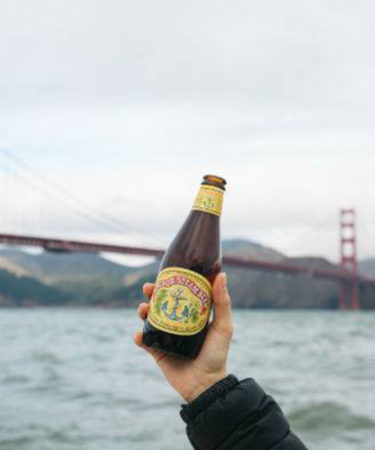San Francisco’s Anchor Brewing laid the groundwork for what could become a historical moment in the American beer industry on Thursday, when it announced it is unionizing. The union drive began its public phase on Thursday, Splinter reports.
Anchor’s unionization comes as employees are feeling the tightening grip of “corporatization,” Splinter reports. Anchor sold to Sapporo Holdings in 2017, and although employees say the company culture remained intact at first, conditions have been deteriorating.
Employees — 70 of whom are in the bargaining unit, out of 160 employees total — cite low wages, lack of access to benefits, and even lost beer privileges as reasons for organizing. Additionally, Anchor fears its legendary Anchor Steam beer, which is closely tied to San Francisco, will be produced elsewhere by Sapporo.
Anchor’s organizing committee wrote a letter requesting that Anchor Brewing Company/Sapporo USA (ABC–SUSA) formally recognize its union, ILWU. It would be part of ILWU Warehouse Union Local 6, based in Oakland, which represents Bay Area warehouse workers including wine distributors like Gallo wines, Mission Local reports.
“We’re proud to be Anchor, and we want Anchor to provide good jobs again. Anchor is a San Francisco tradition. It used to be one of its best places to work—and it can be again,” the letter begins. It continues, “Anchor workers should be paid enough to live in San Francisco. We’re struggling to survive and raise our families.”
One part-time employee, Denny Miller, described his pay as “starvation wages.” He makes minimum wage, $15 per hour in California. As the cost of living increases in San Francisco, employees are being priced out of their homes.
Brace Belden, another part-time worker, said his hours are capped at 29 hours per week because the company is required to provide health benefits for those who work 30 hours or more. “It’s really difficult to pay rent with my deep love of beer,” Belden said.
Cesar Ibarra, an employee of eight years, told Splinter the brewery also stopped contributing to employees’ 401K plans.
“It’s not right for a company to want to claim that branding and that identity of San Francisco, yet at the same time create conditions that don’t allow their workers to survive [in the city],” Garrett Kelly, a brewer who has worked at Anchor for three years, said. “People are tired of being fed the line that, ‘oh, you know, if you do what you love, you never work a day in your life.’ The reality is, it’s still work,” he told Splinter.
Issues with safety and employee benefits are not unique to Anchor; they are unfortunately commonplace in the brewing industry, a manufacturing job that often requires long hours in hazardous conditions.
The Brewers Association offers resources including free online brewery safety training to help remedy this. Anchor, meanwhile, hopes its drive will encourage other brewery workers to organize their shops.
